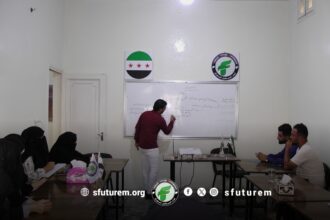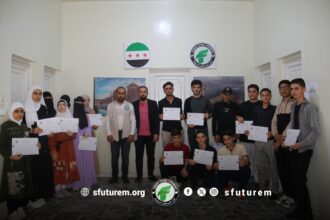The Role of Family Education in Combating Extremist Mindsets Among Children:

Introduction:
Two factors influence a person from childhood in making decisions: either their decisions in all aspects of life are rational, or they become extremist!
The first factor: Intellectual factor, which comes through culture, religion, customs, and traditions.
The second factor: Social circumstances.
Social circumstances play a significant role in shaping children’s personalities and their moral and behavioral directions. Sometimes, these conditions can instill an extremist mindset in children.
The social environment in which a child grows plays a decisive role in determining their exposure to extremist ideas. Children who grow up in environments filled with violence, discrimination, or poverty may be more prone to radicalization. Among the social influences are:
1- Education and schools:
Education plays a vital role in shaping children’s opinions and thoughts.
Schools that do not promote critical thinking, tolerance, and acceptance may increase the likelihood of children being drawn to extremism.
2- The role of the family:
The family is the first place where a child learns values and beliefs.
If extremist ideas are present, or there are poor educational behaviors within the family, the child may easily adopt negative thoughts.
3- Media and the internet:
Media and the internet have a significant influence on children’s opinions and thoughts. The extremist content available online may instill extremist ideas in children’s minds.
It is crucial to pay special attention to the social conditions in which our children grow up, by providing a safe and stable environment for them, ensuring they receive a good education, instilling values of tolerance and acceptance in them, and through our efforts in spreading awareness at the Syrian Future Stream’s Family Bureau, we will highlight an essential aspect of social circumstances, which is the role of the “family” in establishing the child’s mindset. The child who will be influenced all his life by this upbringing, through making decisions that could be fate-changing not only for his personal life but for society as a whole.
The Role of the Family in Instilling an Extremist Mindset:
The family is the fundamental nucleus of society and plays a significant role in shaping children’s personalities and their moral and behavioral directions. Sometimes, the family is the first place where a child learns their values and beliefs, and if extremist ideas exist within the family, the child may easily adopt these ideas.
According to a study from Leiden University, the influence methods parents use on their children’s thoughts development can be direct and explicit (like abusing children, shouting at them, not allowing them to ask childish questions, using violence and a stick to correct children’s mistakes instead of having a dialogue with them and addressing them according to their childlike mental level). They can also be indirect (like children imitating their parents and relatives).
Furthermore, the upbringing and education by the family play a vital role in shaping children’s opinions and thoughts. Families that do not promote critical thinking or tolerance and acceptance may increase the likelihood of children being drawn to extremism. Additionally, proper nutrition during sensitive periods of brain development may reduce the risk of improper brain function developments, such as those that might increase the risk of extremism, and this is also a responsibility of the family.
It is crucial to pay special attention to the conditions in which our children grow up, by providing a safe and stable environment for them, ensuring they receive a good education, instilling values of tolerance and acceptance, despite the consequences of war! As much as possible, we can contribute to protecting our children from extremism and radicalization.
Certainly, a mother plays a significant role in instilling an extremist mindset in her children as well. The mother is the first figure a child recognizes, and she shapes the initial steps of their personality formation. Therefore, a mother’s influence on her child can be substantial, whether that influence is positive or negative.
Moreover, the family has a significant effect on human development, starting from childhood to adulthood. Strong family ties, for instance, increase the likelihood of a person developing a healthy mental state. According to the theory of Erik Erikson, an American psychologist, who presented a theory of psychosocial development spanning eight stages throughout one’s life, he believes that at each stage, an individual faces a conflict or crisis that they must overcome. These stages are:
- Trust vs. Mistrust (birth to 18 months) – In this stage, children learn to trust others if their needs are consistently met.
- Autonomy vs. Shame and Doubt (18 months to 3 years) – In this stage, children learn to become more independent.
- Initiative vs. Guilt (3 to 5 years) – In this phase, children learn to deal with responsibility and control their surroundings.
- Industry vs. Inferiority (6 to 11 years) – Here, children learn how to manage tasks and work.
The family, in its pivotal role, plays a crucial part in how children navigate these stages. If the family provides a supportive and safe environment, it increases the chances of children successfully overcoming the challenges of these stages. Consequently, there’s a higher likelihood of them becoming happy and mentally healthy adults.
Unhealthy family practices:
There are several incorrect parenting methods that can negatively affect children, including:
- Domination: Enforcing strict order on children by relying on parental authority, suppressing the child’s personality.
- Overprotection: Overly shielding children to the point where parents perform tasks meant for the child.
- Inconsistent Treatment: Treating children differently in varying situations, sometimes even contradicting previous stances.
- Harshness and Rejection: Using physical or psychological violence on children, depriving them of parental care and making them feel unwanted.
- Discrimination: Failing to treat all children equally and fairly, showing bias in treatment.
- Excessive Leniency and Pampering: Yielding to children’s demands, even if they are unrealistic.
Healthy parenting steps families need:
There are many ways parents can promote tolerance and acceptance in their children, such as:
- Healthy dialogue: Using the right methods to communicate with the child can be effective rather than using force or hitting.
- Setting goals, whether academic or at home, in simple ways to motivate the child.
- Self-learning: Encouraging children to learn on their own and seek the truth.
- Reinforcement: Using electronic appreciation certificates available online.
- Training students to deliver speeches about tolerance and rationality and sharing them on social media.
- Activating a supervisory role on social media sites and controlling them to implement an effective policy preserving values.
Conclusion:
Undoubtedly, we are living through a war that has taken a harsh toll on all of us. Yet, the onus remains on families to take necessary precautions and, at the very least, to avoid poor educational practices. There’s an essential need, especially for parents and notably mothers, to adopt sound educational methods.
Thus, in the Syrian Future Movement, we give paramount importance to spreading family and educational awareness, whether through our educational and instructional offices in Syria or by supporting all the calls for wise education in Syria. We place great emphasis on the role of the family in nurturing a healthy and balanced Syrian generation, upon which relies the construction of a bright and promising future.
Arabic and Foreign Sources and References:
- A study on the transmission of extremism within a family context – Leiden University (universiteitleiden.nl)
- Farouk Abu Taimeh, The role of the family in proper mental education for their children, The role of the family in proper mental education for their children – Scientific and educational horizons (al3loom.com)
- ran_yfc_children_growing_upin_extremist_families_24-25_04_2019_en.pdf (europa.eu)
- Women’s Participation in Transforming Conflict and Violent Extremism | United Nations
- Liza Said, Extreme thinking: how do we protect our young children from it? • Nine (ts3a.com)
- Protecting children’s awareness from extremist thought – Etidal (etidal.org)
- 14 wonderful and enjoyable ways to motivate your child | Sayidaty Magazine (sayidaty.net)
- Majida Muhammad Al-Najem, Parenting methods and their relationship to some family and school problems.
- Sabrina Matnan, Wrong methods in raising children, Wrong methods in raising children – Al-Manal Magazine (almanalmagazine.com)
- Family Influences in Human Development – Individual and Family Development, Health, and Well-being (pressbooks.pub)
- Understanding Life as a Developmental Process | Psychology Today
- Erikson’s 8 Stages of Development (webmd.com)
- Erikson’s Stages of Development (verywellmind.com).
Iman Al-Muhammad
Researcher in the Department of Research and Studies
Scientific Office of
Syrian Future Movement.





